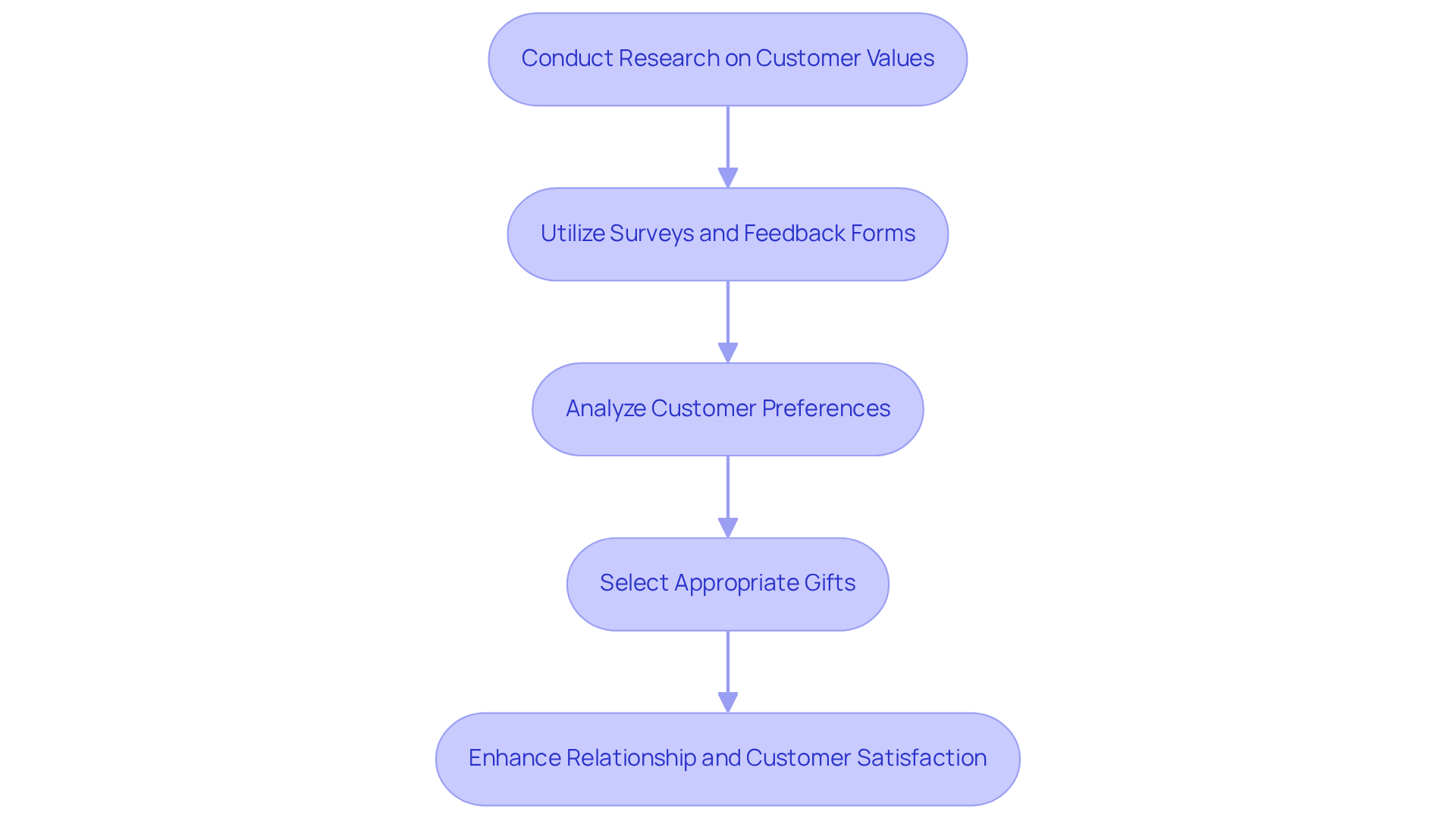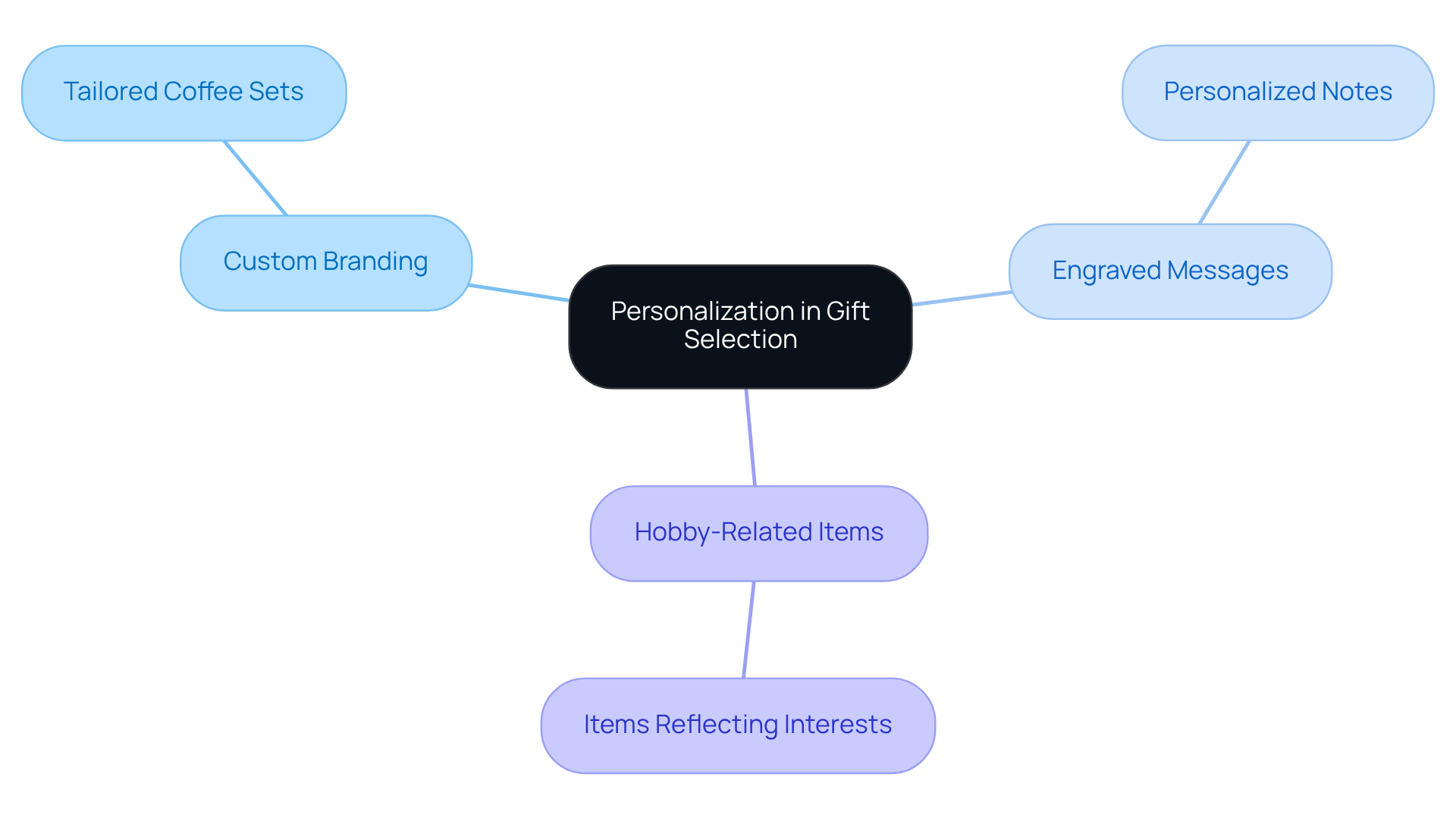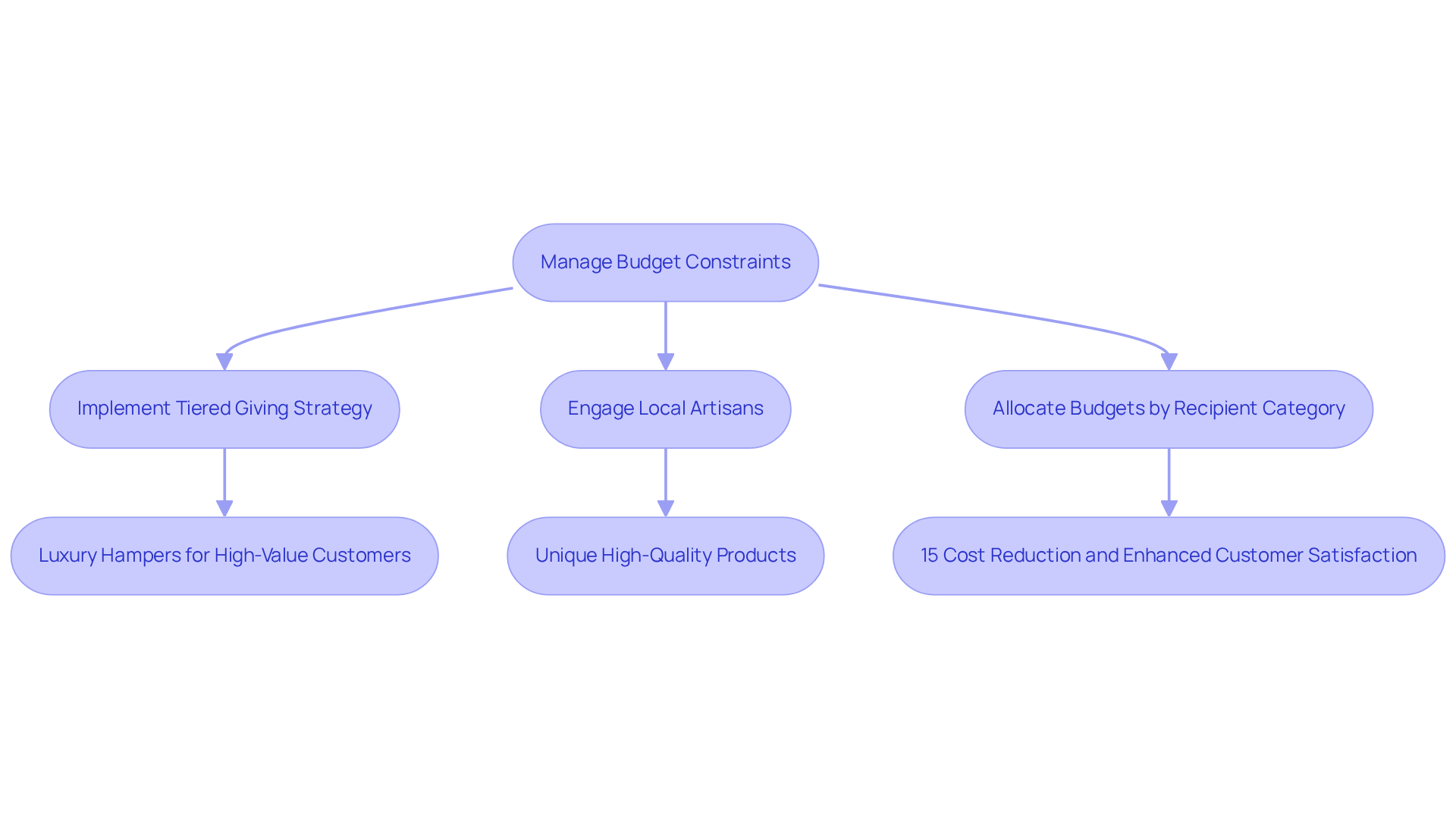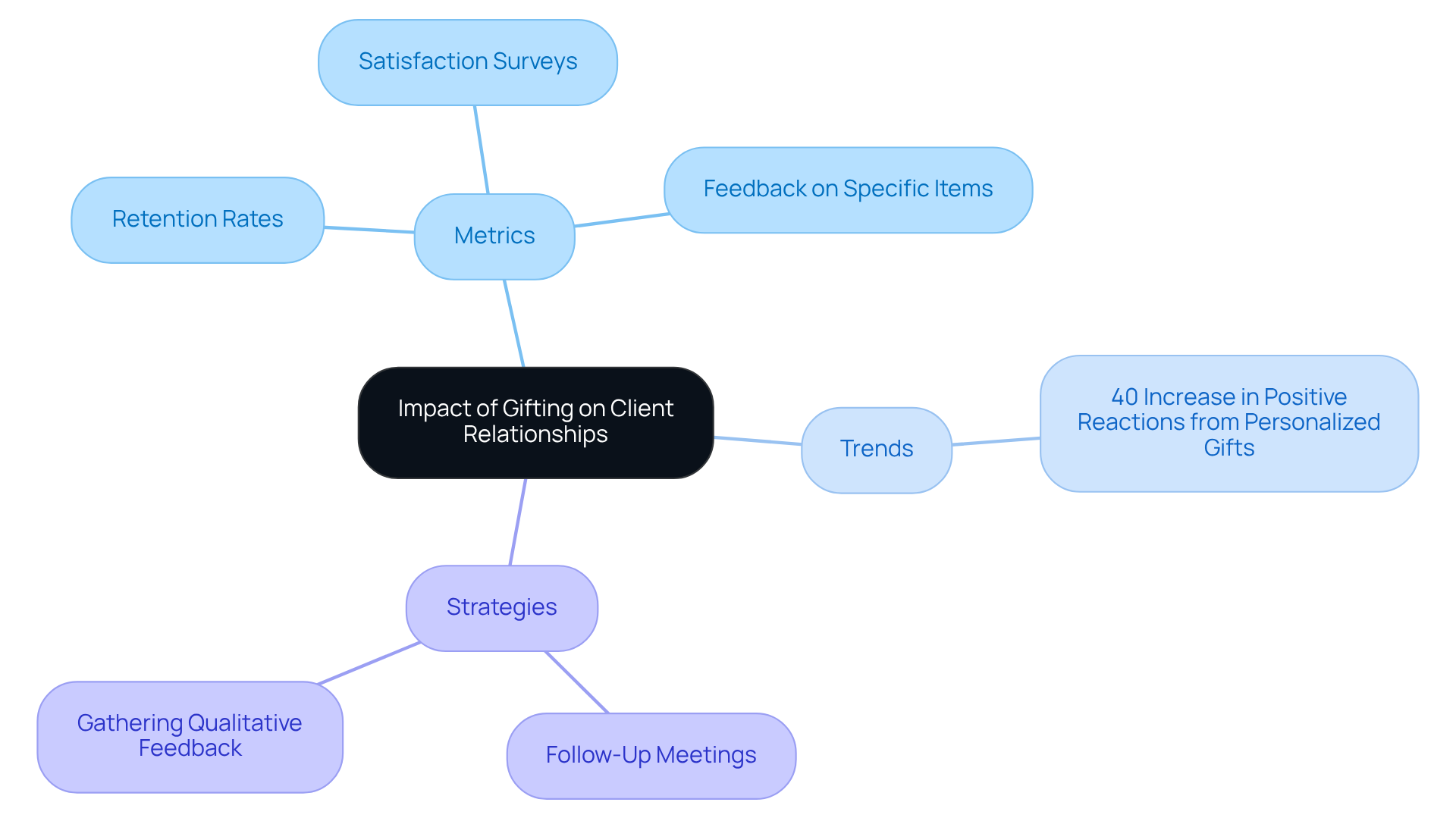Overview
Effective corporate hampers that strengthen client bonds can be achieved through strategic approaches.
- Aligning gifts with corporate values
- Emphasizing personalization
- Managing budget constraints
- Evaluating the impact of gifting
Case studies and metrics support these approaches, demonstrating that thoughtful, customized gifts significantly enhance customer satisfaction and loyalty. This ultimately leads to improved retention and repeat business, reinforcing the importance of investing in meaningful corporate gifting.
Introduction
Crafting meaningful connections in the corporate world often hinges on the art of gifting. Corporate hampers, when executed thoughtfully, serve as powerful tools to strengthen client relationships and enhance brand loyalty. This article delves into four key strategies for creating impactful corporate hampers that align with company values while resonating deeply with clients’ preferences.
How can businesses ensure their gifts leave a lasting impression, navigate budget constraints, and personalize each experience?
Align Gifts with Corporate Values and Client Preferences
To effectively align donations with corporate principles and customer preferences, it is essential to conduct thorough research on your customers' beliefs, interests, and past interactions. Begin by utilizing surveys or feedback forms to gather insights directly from your clientele.
For instance, if a customer prioritizes sustainability, consider environmentally friendly gifts that embody this commitment. Moreover, ensure that the gifts reflect your organization’s core values, such as innovation or community support. This approach not only enhances the significance of the gifts but also strengthens the relationship by demonstrating that you recognize and value what matters to those you serve.
A case study from a leading technology company illustrates that aligning gifts with customer values resulted in a 30% increase in customer satisfaction ratings.

Emphasize Personalization in Gift Selection
To emphasize the significance of personalization, it is crucial to incorporate elements that resonate with the recipient's personality or preferences. This may include:
- Custom branding
- Engraved messages
- Items that reflect their hobbies
For example, if a customer is known for their passion for coffee, a tailored coffee set featuring their name or a unique blend can create a lasting impression. Moreover, leveraging information from past interactions can enhance the customization of gifts to align with personal preferences. A compelling case in point is a financial services firm that implemented personalized gifts, resulting in a remarkable 25% increase in repeat business from clients who received customized items.

Manage Budget Constraints and Source Unique Gifts
To navigate budget constraints while procuring distinctive gifts, implement a tiered giving strategy that incorporates corporate hampers, categorizing recipients based on their significance and relationship status. Allocate varying budget levels for each category, ensuring that high-value customers receive more luxurious corporate hampers.
By engaging local artisans or small businesses, you can uncover unique, high-quality products for your corporate hampers that stand out without exceeding your budget. For instance, a company that sourced handmade items from local artisans not only supported the community but also included these exceptional gifts in their corporate hampers for customers.
This strategic approach led to a 15% reduction in overall expenses for gifts while simultaneously enhancing customer satisfaction.

Evaluate the Impact of Gifting on Client Relationships
To assess the impact of presenting on customer relationships, it is essential to apply metrics such as:
- Retention rates
- Satisfaction surveys
- Feedback on specific items
Regular analysis of this data will reveal trends and highlight areas for improvement. For example, a business that monitored customer feedback on their gifts found that personalized items led to a remarkable 40% increase in positive reactions compared to generic offerings.
Moreover, consider conducting follow-up meetings or calls to discuss the gifts and gather qualitative feedback. This proactive strategy not only demonstrates ongoing interest in the client relationship but also yields valuable insights for future gifting initiatives.

Conclusion
Implementing effective corporate hampers is essential for cultivating robust client relationships. By aligning gifts with corporate values and client preferences, businesses can forge meaningful connections that resonate with their clientele. This strategy not only amplifies the significance of the gifts but also showcases a commitment to understanding and valuing what matters to clients.
Key strategies include the critical role of personalization, which can profoundly influence client satisfaction and loyalty. Selecting gifts that reflect individual preferences and interests enables companies to leave a lasting impression. Furthermore, managing budget constraints while sourcing unique gifts allows organizations to uphold quality without overspending, ultimately leading to enhanced customer satisfaction.
In conclusion, the art of corporate gifting hinges on thoughtful execution. By prioritizing alignment with values, personalizing selections, managing budgets judiciously, and evaluating the impact of gifting, organizations can fortify their client bonds. Embracing these strategies not only enriches the gifting experience but also reinforces the importance of meaningful relationships in the corporate landscape. Taking decisive action on these insights can yield lasting benefits, positioning corporate hampers as a formidable tool in building and sustaining client loyalty.
Frequently Asked Questions
Why is it important to align gifts with corporate values and client preferences?
Aligning gifts with corporate values and client preferences enhances the significance of the gifts and strengthens relationships by demonstrating recognition and appreciation of what matters to clients.
How can companies gather insights about their customers' beliefs and interests?
Companies can gather insights by utilizing surveys or feedback forms to understand their clientele's beliefs, interests, and past interactions.
What type of gifts should be considered for customers who prioritize sustainability?
For customers who prioritize sustainability, companies should consider environmentally friendly gifts that embody this commitment.
What impact can aligning gifts with customer values have on customer satisfaction?
Aligning gifts with customer values can lead to significant improvements in customer satisfaction, as illustrated by a case study from a leading technology company that saw a 30% increase in satisfaction ratings.



